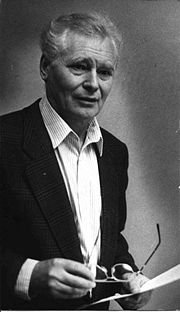
Sergey Kara-Murza
Encyclopedia

Russia
Russia or , officially known as both Russia and the Russian Federation , is a country in northern Eurasia. It is a federal semi-presidential republic, comprising 83 federal subjects...
n chemist
Chemist
A chemist is a scientist trained in the study of chemistry. Chemists study the composition of matter and its properties such as density and acidity. Chemists carefully describe the properties they study in terms of quantities, with detail on the level of molecules and their component atoms...
, historian
Historian
A historian is a person who studies and writes about the past and is regarded as an authority on it. Historians are concerned with the continuous, methodical narrative and research of past events as relating to the human race; as well as the study of all history in time. If the individual is...
, political philosopher and sociologist.
Sergey Kara-Murza was graduated with degree in chemistry from Moscow State University
Moscow State University
Lomonosov Moscow State University , previously known as Lomonosov University or MSU , is the largest university in Russia. Founded in 1755, it also claims to be one of the oldest university in Russia and to have the tallest educational building in the world. Its current rector is Viktor Sadovnichiy...
in 1961. Between 1966 and 1972 he worked as a Soviet chemical specialist in Cuba
Cuba
The Republic of Cuba is an island nation in the Caribbean. The nation of Cuba consists of the main island of Cuba, the Isla de la Juventud, and several archipelagos. Havana is the largest city in Cuba and the country's capital. Santiago de Cuba is the second largest city...
.
In 1983 Sergey Kara-Murza defended his doctoral thesis in history of science and technology and in 1988 became a professor.
Sergey Kara-Murza taught in Russia and Spain
Spain
Spain , officially the Kingdom of Spain languages]] under the European Charter for Regional or Minority Languages. In each of these, Spain's official name is as follows:;;;;;;), is a country and member state of the European Union located in southwestern Europe on the Iberian Peninsula...
and authored several publications and academic studies dedicated to history, science and society. His most prominent works: Mind Manipulations published in 2000 was dedicated to establishing and describing the problem of manipulation of public opinion by pro-Western mass media in Russia and Soviet Civilization, a work about history, political and economic organization of USSR. In the late 1990s and early 2000s Sergey Kara-Murza wrote a number of political and philosophical works on Eurocentrism
Eurocentrism
Eurocentrism is the practice of viewing the world from a European perspective and with an implied belief, either consciously or subconsciously, in the preeminence of European culture...
, Globalization
Globalization
Globalization refers to the increasingly global relationships of culture, people and economic activity. Most often, it refers to economics: the global distribution of the production of goods and services, through reduction of barriers to international trade such as tariffs, export fees, and import...
and Color revolution
Color revolution
Colour revolutions is a term that was widely used by the media to describe related movements that developed in several societies in the CIS and Balkan states during the early 2000s. The term has also been applied to a number of revolutions elsewhere, including in the Middle East...
s. His articles were frequent in left-wing/nationalist Russian newspapers such as Pravda
Pravda
Pravda was a leading newspaper of the Soviet Union and an official organ of the Central Committee of the Communist Party between 1912 and 1991....
, Alexander Prokhanov
Alexander Prokhanov
Alexander Andreyevich Prokhanov is a Soviet and Russian writer. He is a member of the secretariat of the Writers Union of the Russian Federation and the editor-in-chief of ultra-nationalist newspaper "Завтра" ....
's Zavtra and Soviet Russia
Soviet Russia (newspaper)
Sovetskaya Rossiya is a political newspaper in Russia. It kept its name after the dissolution of the Soviet Union and presently presents itself as a left independent newspaper. Current editor — MP Valentin Chikin....
.
Sergey Kara-Murza became known for his anti-Globalization
Anti-globalization
Criticism of globalization is skepticism of the claimed benefits of the globalization of capitalism. Many of these views are held by the anti-globalization movement however other groups also are critical of the policies of globalization....
, anti-liberal
Anti-liberal
Anti-liberal philosophies:*Authoritarianism*Communism*Fascism*Revolutionary Socialism*Conservatism*Traditionalist School...
and anti-Westernist views; however, he also rejects traditional Marxist
Marxism-Leninism
Marxism–Leninism is a communist ideology, officially based upon the theories of Marxism and Vladimir Lenin, that promotes the development and creation of a international communist society through the leadership of a vanguard party over a revolutionary socialist state that represents a dictatorship...
ideology. He has sharply criticized the Russian economic reforms of 1990s; he is in favor of a more collectivist economy. Having supported president Putin's policies he is opposed to 'color revolutions'. Sergey Kara-Murza's ideological views have been described as Russian "left-wing conservatism".
He is a relative of Vladimir A. Kara-Murza
Vladimir A. Kara-Murza
Vladimir A. Kara-Murza is a Russian journalist and TV host.-References:...
and Vladimir V. Kara-Murza
Vladimir V. Kara-Murza
Vladimir V. Kara-Murza is a Russian journalist, historian and politician. He studied in Great Britain at the John Lyon School in Harrow, London, and graduated with an B.A. and M.A. in History from Cambridge University...
.

